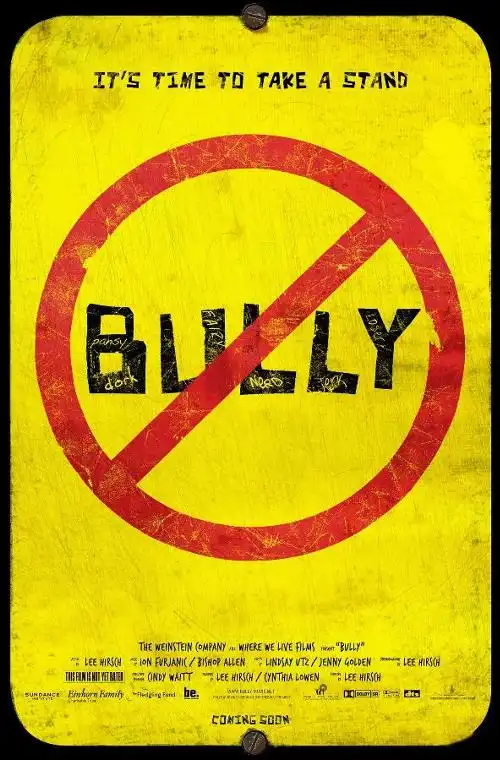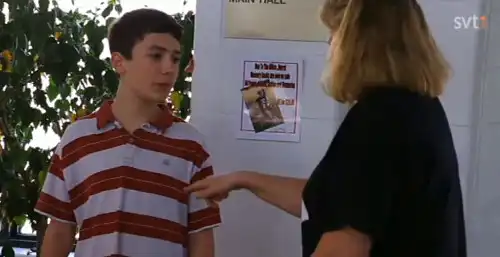We're All Victims of the Bully Speculations by Stefan Stenudd
It's particularly alarming when children are bullied. That, the adults surrounding them should be able to deal with – but alas, they rarely manage to stop it. Instead, they often unknowingly partake in worsening the situation. It's terribly evident in the TV documentary Bully (2011). The adults fumble when confronted with the problem, mainly occupied by claiming their own innocence. The children have no one to turn to. The most striking example of that is a scene starting at 28:30 into the film. A school principal demands the bully and the bullied to shake hands, as if that would solve the problem. She even says that by the handshake they should let the thing drop. A good deal for the bully... When the bullied boy is reluctant to do that, the principal immediately starts to scold him. Actually, she jumps to a bullying behavior. “That means you're just like him”, she tells the boy, comparing his behavior to that of the bully. “I don't hurt people,” he replies. “By not shaking his hand you're just like him,” the principal insists. “Like someone who pushes you into walls, threatens to break your arm, threatens to stab you and kill you?” the boy inquires with admirable guts. “He apologized,” the principal replies, although that's not at all true. It was never even demanded of him. She continues: “And have you reported all that sort of stuff?” “Yes!” “Ok, then it's been taken care of,” the principal immediately concludes. “All of them said,” he continues, “even the cops told him to stay away from me – and he doesn't.” “Right. Can you try to get along?” the principal insists, as if it's all up to the bullied boy. “I think you guys might be really good friends at some time.” “We were,” the boy replies, “and then he started bullying me.”
 From the scene quoted above, in the TV documentary Bully (2011).
That's as frequent as it is absurd. The reluctant efforts from responsible adults are mostly focused at the bullied, not the bullies, as if the former are after all the real problems and somehow the causes. They are the ones moved away, if it comes to that, and they are the ones suggested to change their behavior in some way. So, what does it say other than that they are regarded as the causes of the bullying? Parents often fail to be any substantial support, since they only rule that little cell of the family and its home. Therefore, they also tend to demand of their bullied child to make some kind of change. They feel helpless, of course, and therefore really don't want to know, although stating the opposite. People want problems to go away. In the case of repeated bullying, that means they tend to compute that the problem will be solved if the one that goes away is the bullied. That's not something they would readily confess, but it's what their action – and lack of action – confirms. When school officials and parents meet, they tend to find common ground in just that: wanting the problem to go away, and escaping blame. This is also evident in several scenes of the TV documentary. Parents blame the school and the school claims the problem to be insoluble – thereby blaming society as a whole, or mankind or whatever. The bullied child is little but a hostage in this battle of blame, and sees no hope of ceasing to be a victim. Bullying is always a consequence of the social commitment to conformity. Children and adults alike are expected to conform to the norm. Be like everybody else, in every way. Those that stick out are either praised or condemned, depending on the nature of their deviation. It comes down to the rude survival of the fittest. When people stick out from the norm they are admired if they do so in a way that signals some kind of superiority. If it's interpreted as a weakness, though, the instinctual behavior of exclusion is triggered. We are animals and frequently behave so, although we fail to admit it. When our instincts are free to roam, they make us want to follow the ones we perceive as strong and desert the ones we see as weak. The human condition is far from perfect, but it is possible to change tremendously, we've learned through history. The job's just not yet done, completely. Far from completely. The flaw is not with those who stand out, but with all of us who continue to protect the instinct of deserting those who do. The bully is not the only one at fault. So is everyone unable to resist that malicious instinct. That's a lot of people – to some extent all of us. No wonder, then, that the problem is unsolved. We must start by admitting where it lies. We must admit our blame. Otherwise we are unlikely to do any better than the principal quoted above. We have to remember Voltaire's statement about tolerance, and we need to widen it. Not only should we accept and defend different opinions than our own, but the same positive tolerance should be shown other behavior and characteristics as well. Only to the extent we commit our society to tolerance will we free it from intolerance. So, we have a long way to go. The only intolerance we should foster is one against intolerance. As for most bullying, especially among children, it seems to stem from conformity and intolerance regarding gender roles. Boys and girls are expected to grow up to men and women, by which we mean that they must conform to the images we make of the genders. It's when children deviate from those norms that the bullying becomes the most severe and persistent. This is easily explained by Darwinism and the survival of the fittest, which is a mechanism based on procreation, therefore on how males and females interact. Our instincts tell us that there's a war between males to be alpha males, and one between females to be alpha females. What that comprises may differ through time and from one culture to another, but the vicious force towards conformity is the same everywhere. It's very important to understand that what the instincts dictate about gender roles is not necessarily relevant even for the survival of the fittest. Society and man's role in it change much quicker than instincts do, so they are not to be trusted blindly. If we don't question our instincts, they may very well lead to the extinction of our species. As for our gender roles, they have unquestionably caused a lot of suffering through the ages. They still do. We need to rise above that. We can. We have defeated several other instincts in order to create a society closer to the ideals we agree about. So, bullying is not an isolated problem with its particular solutions. It's a symptom of what we need to reform in society as a whole. The bullied is the canary in the coal mine, the first one to suffer something that's wrong and will take its toll on us all – if we don't listen to this warning and act upon it.
Stefan Stenudd February 22, 2013
More Speculations
About CookiesMy Other WebsitesCREATION MYTHSMyths in general and myths of creation in particular.
TAOISMThe wisdom of Taoism and the Tao Te Ching, its ancient source.
LIFE ENERGYAn encyclopedia of life energy concepts around the world.
QI ENERGY EXERCISESQi (also spelled chi or ki) explained, with exercises to increase it.
I CHINGThe ancient Chinese system of divination and free online reading.
TAROTTarot card meanings in divination and a free online spread.
ASTROLOGYThe complete horoscope chart and how to read it.
MY AMAZON PAGE
MY YOUTUBE AIKIDO
MY YOUTUBE ART
MY FACEBOOK
MY INSTAGRAM
STENUDD PÅ SVENSKA
|
 Sunday Brunch with the World Maker
Sunday Brunch with the World Maker